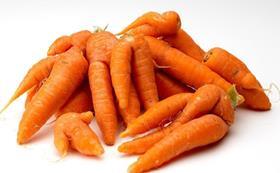
Almost half of shoppers would buy misshapen fruit and vegetables if they were good quality, while 42 per cent said lower prices would create even more of an incentive, a new report has found.
Over half (56 per cent) of UK adults believe retailers should do more to reduce the amount of food they throw away, while 28 per cent are concerned about the amount of fruit or vegetables they waste, the report from Mintel found.
“It is clear that consumers are open to ‘ugly’ produce, but where oddly shaped fruit and veg sits with mainstream offerings, it is at risk of going unchosen, even if subconsciously,” said Mintel’s head of UK food, drink and foodservice research, Kiti Soininen.
The news comes as yesterday Dutch retailer Albert Heijn launched a range of misshapen fruit and vegetables, named Misfits, which will be sold online.
Soininen said that there is scope to use the non-standard quality of produce as a selling point, and retailers could position ‘ugly’ produce as a tasty and low-cost option.
The report also found that 93 per cent of all Britons buy fresh fruit every week, while 90 per cent purchase fresh vegetables, and these figures have grown since last year.
Also shown to be in growth is the wider fruit and vegetable market, which has seen a 16 per cent rise in value between 2009 and 2014. Sales of fruit and vegetables are expected to rise to just under £19 billion by 2019, as inflation continues to drive growth.
Price is still a driving factor when consumers buy fresh produce – 62 per cent says low price is important, 41 per cent cited the best before date, 38 per cent highlighted promotions and 35 per cent said they would like to see a more diverse range, including more ready-to-eat snack formats.
“Until the income squeeze eases significantly, spending on fruit and vegetables as a day-to-day grocery item will remain under scrutiny,” said Soininen. “However, certain added-value areas hold potential, such as ready-to-eat snack formats and initiatives that helps to extend shelf life.”
More than two thirds (67 per cent) of Britons think that the health benefits of fruit and vegetables should be stated on packaging.
“It is now common across much of packaged fruit and vegetables to highlight the product’s nutrient content on-pack, such as the folate and Vitamin A in a bag of salad. Expanding beyond this to communicate relevant health benefits, something not commonly done in this market, should offer products standout given that most people would like to see the health benefits of fruit and vegetables stated on-pack,” Soininen added.



